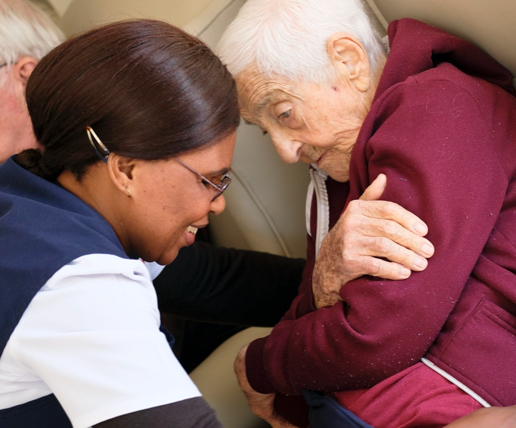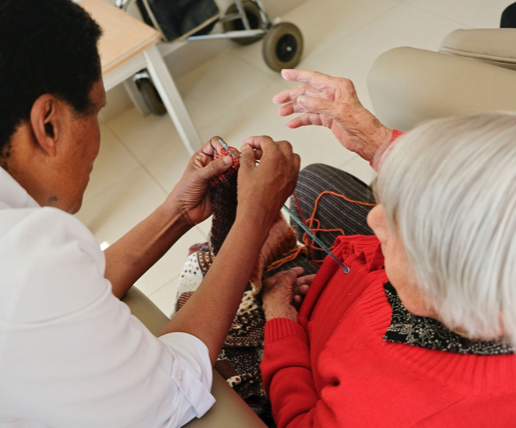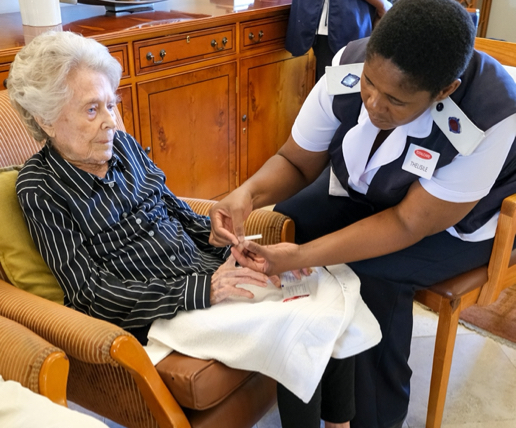
As seniors age, there comes a time when they aren’t able to care for themselves any longer. Performing daily tasks, such as dressing, bathing, cooking or even moving around becomes difficult due to physical frailty, mental incapacity or sometimes both. In these instances, moving into a professional and fully equipped frail care facility is very often the right choice to ensure the safest possible environment and best quality of life.



If you’re thinking about frail care, here are a few things you should know before making your decision:
1. Frail care is a long-term living solution
After a health incident, such as a stroke or fall, some people may need acute hospital care for a short time to recuperate before returning to their normal daily lives. Frail care, however, is for people who no longer have the ability to care for themselves on a daily basis, and who won’t be able to do so for the rest of their lives. Moving into frail care marks a new stage of life, one that is both necessary and beneficial to elderly people who need a greater level of care.
After a health incident, such as a stroke or fall, some people may need acute hospital care for a short time to recuperate before returning to their normal daily lives. Frail care, however, is for people who no longer have the ability to care for themselves on a daily basis, and who won’t be able to do so for the rest of their lives. Moving into frail care marks a new stage of life, one that is both necessary and beneficial to elderly people who need a greater level of care.
2. Frail care services vary across retirement villages
While frail care facilities are designed for the needs of older people, the level of care, services and facilities can be very different from one place to another. Some retirement villages may have basic services such as carers providing help with daily tasks including personal hygiene, cooking, cleaning and taking medication. Another frail care facility might have full-time medical staff along with on-site theatres for urgent hospital care, surgeries or life support. While others offer a comprehensive range of services, from independent and assisted living to frail care and specialised facilities for people with dementia.
While frail care facilities are designed for the needs of older people, the level of care, services and facilities can be very different from one place to another. Some retirement villages may have basic services such as carers providing help with daily tasks including personal hygiene, cooking, cleaning and taking medication. Another frail care facility might have full-time medical staff along with on-site theatres for urgent hospital care, surgeries or life support. While others offer a comprehensive range of services, from independent and assisted living to frail care and specialised facilities for people with dementia.
3. Frail care is generally not covered by medical aid
When it comes to medical aid providers, there is a marked difference between their definition of medical care and frail care. Short-term care for emergency incidents such as a stroke, heart attack or hip fracture may be covered for a limited period as it falls under medical care. However, long-term assistance with daily living is not considered part of medical aid cover. Certain medical aid schemes may cover some frail care, but it’s usually very limited and comes at a high cost.
When it comes to medical aid providers, there is a marked difference between their definition of medical care and frail care. Short-term care for emergency incidents such as a stroke, heart attack or hip fracture may be covered for a limited period as it falls under medical care. However, long-term assistance with daily living is not considered part of medical aid cover. Certain medical aid schemes may cover some frail care, but it’s usually very limited and comes at a high cost.
4. Frail care can be a more affordable option to home-based care
In some cases, you may consider keeping your elderly loved one at home and contracting a live-in or part-time home carer. While this can be the best solution for some people who are very averse to leaving the familiarity of their homes, it can be very costly. A full-time live-in carer can cost around R22 500 per month, excluding the costs of GP visits, transport, groceries, home security, housekeeping and so on. In comparison, some all-inclusive retirement villages with frail care services can cost anywhere between R12 500 to R20 500 per month depending on the level of care and services provided.
In some cases, you may consider keeping your elderly loved one at home and contracting a live-in or part-time home carer. While this can be the best solution for some people who are very averse to leaving the familiarity of their homes, it can be very costly. A full-time live-in carer can cost around R22 500 per month, excluding the costs of GP visits, transport, groceries, home security, housekeeping and so on. In comparison, some all-inclusive retirement villages with frail care services can cost anywhere between R12 500 to R20 500 per month depending on the level of care and services provided.
We offer seven sophisticated and affordable retirement villages with specialised and integrated frail care, assisted living and dementia care with an all-inclusive offering featuring highly qualified and compassionate staff, 24-hour professional medical care, housekeeping, nutritional meals, panic buttons, wheelchair access, and a range of other amenities to ensure your elderly loved ones get the highest level of care and comfort.
Before moving in, our medical team will assess the exact level of care your loved one needs to develop the most suitable care plan. For more information, click here.
There comes a time in life when the elderly are no longer able to care for themselves. Frail care can provide the professional support and assistance they need with everything from personal hygiene and nutrition to mobility, companionship and comfort in a safe and fully-equipped environment. If you’re thinking about frail care for an elderly loved one, consider these facts to help you make a more informed decision.
